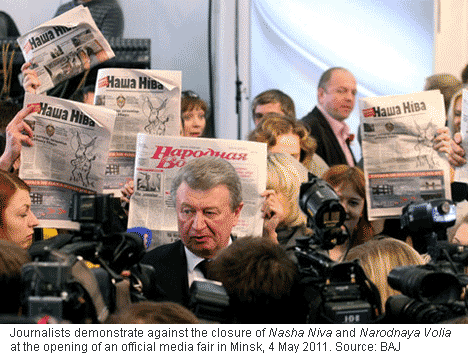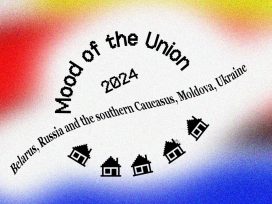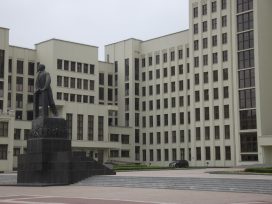The year 2010 saw both local elections and the much more important presidential election taking place Belarus. Although originally scheduled to take place in February 2011, the governmental authorities decided to conduct the latter two months earlier. While it is usual in Belarus for freedom of speech and other civil political rights and freedoms to deteriorate on the eve and during large political campaigns, the scenario in 2010 was somewhat different.
The pressure on media outlets and journalists increased in the first half of the year. KGB searches were conducted under the pretext of criminal proceedings on a criminal defamation case, filed by KGB general Korzh, at private apartments and workplaces of independent journalists Sviatlana Kalinkina, Maryna Koktysh, Natallia Radzina and Iryna Khalip. The KGB agents seized the media workers’ computer equipment from their flats as well as from the Narodnaya Vola and Charter’97 editorial offices. It should be emphasized that the technical equipment hasn’t been returned to the journalists, despite the fact that they are only regarded as witnesses to the case.
The Ministry of Information of Belarus issued official warnings to the editors of leading non-state newspapers Narodnaya Vola and Nasha Niva, as well as to Komsomolskaya Pravda in Belarus, which boasts one of the largest circulations in the country. Nasha Niva and Narodnaya Vola received three and four official warnings respectively from the Ministry of Information in 2010. In order to close down a media outlet judicially, it is enough to issue two official warnings, and even one warning in a number of cases, for any insignificant reason within a year. [Editors’ note: On 25 April 2011, Nasha Niva and Narodnaya Vola were issued with lawsuits having exceeded the yearly “quota” of warnings. The court cases are scheduled for 11 and 13 May respectively. The closure of both newspapers is a foregone conclusion.]

The journalist and a civil activist Aleh Biabienin was found dead in his summer house on 3 September 2010. Journalists who doubted the official version of suicide received threats from unidentified people. The pressure on mass media decreased somewhat in the second half of 2010. Obviously, the trend was caused by a strong desire of the authorities to win the EU’s approval for the presidential election procedures.
However hopes were dashed by the disproportionate use of force by riot police on the election day of 19 December 2010 and the following repressions, which affected various social groups, including journalists.
The state of mass media in Belarus
According to the Ministry of Information of Belarus, 1344 printed periodical editions were registered in Belarus as of 1 January 2011. The official authorities emphasize that only 397 of them are owned by the state. However they fail to note that the majority of non-state printed media deal with areas such as entertainment and advertising. According to monitoring by the Belarusian Association of Journalists (BAJ), there are no more than 30 registered non-state socio-political media in Belarus today. Almost half were expelled from the state-owned networks of press distribution and retail before the previous presidential election in 2005 and have not been reinstated since. Absolutely all independent socio-political periodicals face complications with attracting advertisers. As a result of economic, political and legal discrimination, the number of independent media outlets has decreased by half in the last decade. Consequently, no officially registered independent newspapers can be found in some regions of Belarus (e.g. Homiel). At the same time, the Ministry of Information refuses to register new media outlets under farfetched pretexts.
The state-owned media, in contrast, enjoy administrative support, various preferences and financing. In 2010, a total of 167,185,329.3 thousand Belarusian rubles (approx. euros 40 million) were issued from the national budget. In 2011, national subsidies to the state-owned media outlets has risen to 214,728,238.9 thousand Belarusian rubles (approx. euros 54 million). More than euros 43 million of this sum is allocated to funding state TV and radio.
The situation as regards TV and radio broadcast media in Belarus corresponds even less to generally accepted democratic standards. The overwhelming majority of officially registered TV and radio programs belong to the state: 165 out of 237 media outlets. The remaining 72 non-state electronic media are nevertheless fully controlled by the local and national governmental authorities, as a result of the existing system of broadcast licensing in Belarus. Thus, the popular Autoradio FM-radio station was taken off air at the beginning of 2011 for broadcasting the election addresses of opposition candidates Andrei Sannikau and Uladzimir Niaklayeu on the eve of the Presidential election 2010. (Broadcasting of election addresses is allowed in Belarusian legislation.)
The Internet remains the most liberalized sector of information space in Belarus. The number of web-users exceeds 4 million in Belarus nowadays. (The number of regular Internet users is considerably smaller, though gradually increasing with time.)
The Belarusian authorities have reacted to the growing importance of the Internet for Belarusian citizens by attempting to take control of it. Consequently, the Presidential Ordinance No. 60 of 1 February 2010 (“On the Measures to Improve the Use of the National Segment of the Internet Network” / The National Registry of Legal Acts of Belarus, 2010, No.29, 1/11368/) came into effect on 1 July 2010. Twelve by-laws were adopted in the pursuance of the ordinance within the course of a year. From now on,
– all web-resources providing their services in Belarus must transfer to Belarusian servers and obtain official registration in the country;
– Wi-Fi users and cybercaf visitors must provide personal ID;
– the modems of individual web-users are identified;
– service-providers and mobile operators must install CORM software for the spying purposes of the KGB and the police;
– the authorities compile “black lists” of websites that may not be accessed from the state institutions that dominate in the country nor from educational and cultural establishments, such as libraries, schools and universities. Other Internet users may apply for access to these web-pages from their computers to be disabled.
Reportedly, a draft bill has been worked out that makes it a punishable offence to contravene the abovementioned requirements.
Internet users’ access to the majority of independent web-resources covering the presidential election was disabled on the polling day of 19 December 2010. It was impossible to visit the websites of, among others, Charter’97, Belorusskiy Partisan, Salidarnasc online newspaper, The United Civil Party, The United Democratic Forces, electroname, Belarusian Christian Democracy, and Viasna Centre for Human Rights.
Periodically, there appeared problems with access to the webpages of European Radio for Belarus, Radio Liberty and the Tell the Truth! civil campaign. Webusers were also unable to enter their Google, Facebook and LiveJournal accounts. Access to the websites of popular anonymizers was also disabled.
Violations of media and journalists’ rights during the election period
The presidential election 2010 was accompanied by mass violations of media and journalists’ rights. Several journalists belonging to Belarusian and foreign media covering a rally arranged by supporters of one of the presidential candidates, Uladzimir Niaklayeu, held before the closure of polling stations on 19 December 2010 near the centre of Minsk, were knocked down and beaten by a group of security agents, along with other participants of the rally. In the process of confiscating the candidate’s loudspeaker equipment, the masked offenders seized and broke the journalists’ professional photo and video equipment, disregarding the press cards and credentials available.
Detentions and physical attacks on journalists continued after the protest action on the evening of 19 December 2010. According to BAJ updates, no less than 27 media workers were detained. More than 21 reporters were severely beaten by the riot police. Thirteen journalists were held in custody for a period of between 10 and 15 days under administrative law.
Seven media workers and BAJ members have been accused of breaking article 293, parts 1 and/or 2 of the Belarusian Criminal Code (“mass riots”). The list of media workers includes Natallia Radzina, editor of the Charter’97 website; Iryna Khalip, a Novaya Gazeta (Russia) correspondent; Siarhei Vazniak, the Tovarisch newspaper’s editor-in-chief and BAJ board member; Pavel Seviarynets, a BAJ council member; Alaksandr Fiaduta, an independent columnist; Alaksandr Atroshchankau, a spokesman for presidential candidate Andrei Sannikau; and Dzmitry Bandarenka. Alaksandr Atroshchankau has been sentenced to 4 years imprisonment in a strict regime colony. The other media workers face up to 15 years imprisonment. Fiaduta, Sieviarynets, and Bandarenka have been retained in custody. Khalip was released from the KGB isolation ward and placed under house arrest with very strict conditions at the end of January 2011. Radzina and Vazniak were released from jail, having signed written undertakings not to leave their places of residence until the trial.
The wave of repressions against media outlets and media workers continued in the aftermath of the election. Numerous journalists, civil activists and human rights advocates were summoned for interrogation by the KGB. Searches were conducted by the KGB at editorial offices as well as at journalists’ private apartments. The Minsk bureau of European Radio for Belarus was searched by KGB agents in the absence of the editorial staff on 25 December 2010. The state security agents seized no less than 43 items of office equipment, including a server, PCs, laptop computers, dictaphones, cameras and portable video cameras.
KGB agents broke into the Minsk offices of the independent satellite TV channel BelSat on the night of 26 December 2010, using a special electric saw to open the door. However practically nothing could be found at the moment of the raid in the office, since the journalists had taken the equipment and left the premises several days before. BelSat broadcasts from Polish territory and has no official status in Belarus. A couple of days later the KGB conducted searches at private apartments of four journalists cooperating with BelSat, seizing laptops and video cameras.
On 28 December 2010, another search was conducted at the Minsk premises shared by the Belarusian PEN and Nasha Niva newspaper. The KGB agents seized computers, flash drives and CDs. A KGB search was also conducted at the private apartment of Nasha Niva editor-in-chief Andrei Skurko.
KGB agents conducted a search at Yulia Darashkevich’s private apartment on 31 December 2010. They seized the Nasha Niva photo correspondent’s portable HDDs, 2 laptop computers and a dictaphone. On the same day, KGB agents searched a private apartment belonging to Tatsiana Haurylchyk, a Nasha Niva cameraperson. Haurylchyk was summoned to the KGB head office for a “talk” on 3 January 2011. She refused to attend since her attorney wasn’t allowed to accompany her. On the following day, an unknown person phoned the journalist and threatened her with beating.
Conclusions
Not only does the situation in the Belarusian media field continue to fall short of democratic standards, but legislative regulation of freedom of speech has toughened considerably, as have media law enforcement policies in the country. To summarise, the most significant events in the Belarusian media field in 2010 were as follows:
– Enactment of laws aimed at regulating activities in the national segment of the Internet;
– Numerous gross violations of media and journalists’ rights on day of the Presidential Elections 2010 and during the months that followed.
Source: “Mass media in Belarus 2010”, the annual report of the Belarusian Association of Journalists, Minsk 2011







